Of all the unusual student jobs we've come across, Lucy Ackers and her alpaca farm surely tops the lot!
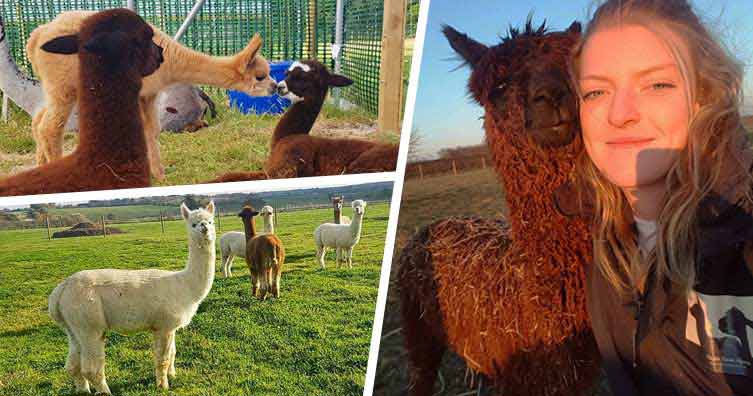
Here at Save the Student, we love hearing about all the weird and wonderful ways that students make and save money.
Whether it's living in a van to save on rent, or becoming a mermaid to earn some extra pennies, we're always impressed by the increasingly creative lengths that students are going to. And in Lucy Ackers, we reckon we may have found the most wholesome and heartwarming example of this yet.
Why? Well, when she's not studying for her degree in Agriculture at Easton and Otley College, near Norwich, Lucy owns and runs her very own alpaca farm!
As you might imagine, between running a farm and completing the final year of her degree, Lucy's schedule doesn't include much free time - but she generously gave us a few minutes to share the realities of her hectic lifestyle.
Becoming an alpaca farmer
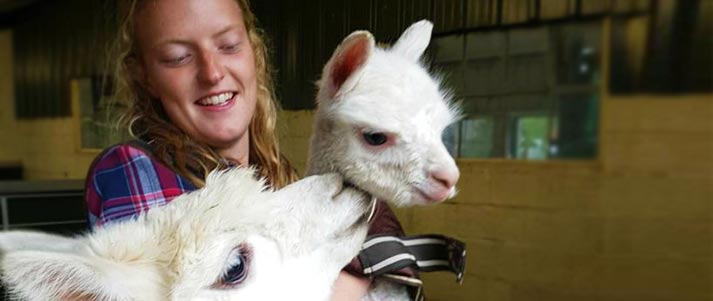
If you're looking to earn some money (or just do something productive with your free time) there are plenty of part-time jobs to try as a student - which begs the question: why did Lucy decide to start running an alpaca farm?
As she readily admits, Lucy started off in a very fortunate position - her family already owned the land she'd need, so half the job was already done.
From there, it was just a case of broaching the subject.
No one was doing anything with the land, so one day I plucked up the courage to tell my parents about my crazy plan. They were very keen as they wanted the house and land to stay within the family.
So, as an Agriculture student with some land to play with, you can see why Lucy was drawn to farming. But still - why alpacas?
I always wanted to get into livestock, but in terms of land, we don't have the largest farm. It's just over 20 acres, which is enough to have a substantial herd of alpacas, but not necessarily enough for other more traditional livestock.
Not to mention that alpacas are amazing and so endearing! They are so easy to love and to be around, and they should live for at least 20 years, so we're in it together for the long haul.
We're certainly not arguing with Lucy on that one - these guys are about as endearing as they come!

As for getting hold of some actual alpacas, a combination of an inheritance and savings from previous jobs were enough for Lucy to start populating Stubbs Farm. Again, Lucy is always keen to stress that she's well aware of how fortunate she's been, and that this may not be possible for many other students!
Running an alpaca farm as a student
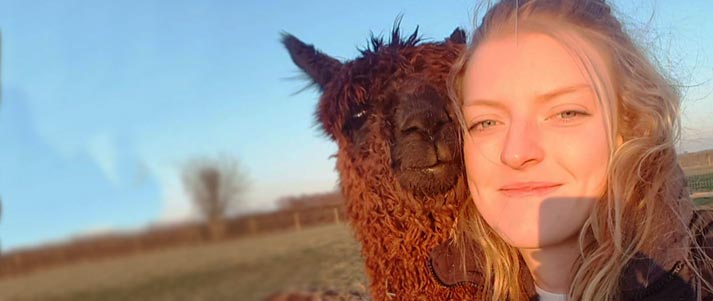
It's probably fair to say that most students can fit a part-time job into their schedules. But alpaca farming isn't a part-time job - in fact, it's more full-time than most full-time jobs!
What's more, as the owner and manager of the farm, Lucy can't just take a day off if she's got a heap of deadlines to meet. At times, it isn't so much a case of fitting her job in around her studies - it's a case of finding the time outside of work to fit in some studying.
I try my absolute best to balance everything appropriately but life doesn't always allow for that.
Sometimes we have a herd health day - where the alpacas are all due their vaccinations, or vitamin boosters, or even just having their toenails cut - the day before I have a deadline. That can be stressful.
In fact, as a final year student, Lucy is currently writing her dissertation. She says that's her priority right now, but with summer on the horizon, the alpacas are due a shearing... a week before Lucy's dissertation is due.
It sounds daunting, but compared to some of her previous experiences, doing some major alpaca upkeep a week before an important deadline seems almost stress-free.
I no longer submit my work in the last few minutes, as in first year I had a problem with one of my alpacas and my attention was on them. I missed the upload deadline by 14 minutes, and that was that - I lost 10% of that grade. That definitely changed the way I approach my assignments.
And, as you might imagine, this is far from the only time that Lucy's alpacas have chosen an inopportune time to demand her attention.
Last summer, I had a baby alpaca born on the morning I had an exam. I had to check he was happy, healthy and feeding, and then dash off to uni, do a two hour exam, come home and make sure he was still happy, healthy and feeding! That was a crazy day, but we survived.
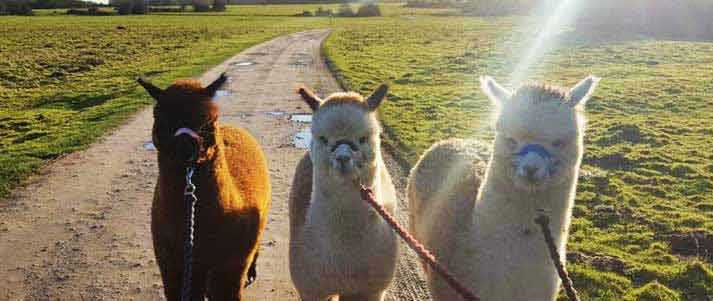
That said, Lucy believes that there is at least one benefit to having so much to do: she's become a lot better at managing her time.
I think the best lesson I have learned since starting this is to be flexible - you have to be able to change your plans for the day at the drop of a hat.
I don’t really have time to procrastinate any more. There was a time when I’d do an all-nighter for uni assignments as, like so many of us, I’d leave it to the last minute. But now there’s not a chance I’ll be doing that.
Now I'll have the essay finished at a respectable time because I know I’ve got to get up first thing the next day and no longer get that lie in.
It's also worth remembering that Lucy is, after all, studying for a degree in Agriculture. Getting a job that's related to your degree is a great way to boost your job prospects while studying, and Lucy is the perfect example of this.
Although we don't learn about alpacas, their management is pretty similar to sheep and some parts are similar to owning cattle, so it's been about selecting appropriate information I learn at uni and applying it to the farm.
The business side of running an alpaca farm
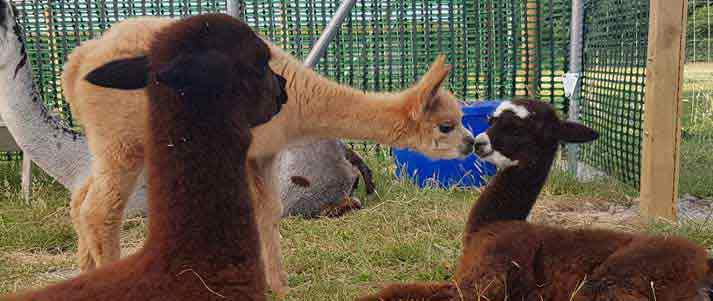
It's not just practical skills that Lucy's been able to use on the farm - agriculture degrees also teach you about the realities of owning and running a business in the modern world.
As well as livestock management we have business and marketing modules, and that's been a great help as it's applicable to everything really.
Alpacas are fairly unusual in that they're not typically farmed for their meat or milk. So how exactly does Lucy manage to turn a profit from her alpacas?
Their fleeces are high quality and there's a market out there for them, but as we only shear once a year, it can be a slow turnaround for that - especially because, as a full-time student, I haven't actually given all my fleeces 100% of my time to process them for sale.
Clearly, given the time it can take to get alpaca fur to market, and the constraints on Lucy's time, the farm wouldn't be able to operate on this income alone. As such, Lucy's had to get creative and find other ways to keep the whole thing running.
We host alpaca experience days where people can come and meet them up close, learn about them and feed them.
At the weekends we also run alpaca treks around our local countryside. Whilst these only run April-September, it's a little steadier than waiting for fleeces to grow, harvest, process and sell.
Perhaps most excitingly of all, though, is the fact that Lucy could soon be opening Stubbs Farm up to the public for overnight stays.
I also have plans to start up my own camping and glamping site, so I feel the alpacas will make a great selling point for that.
Consider our interest firmly registered!
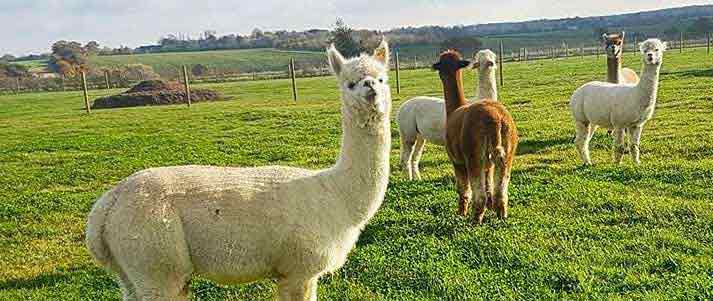
So, with the farm benefiting from an increasingly diverse stream of revenue, is Lucy living the student life of luxury?
The income from the farm is quite variable depending on the time of year, as a large part of our business focuses on tourism, and that's very much weather-dependent.
It makes enough to cover the costs of the animals, and a bit on the side for me to keep, but bear in mind it’s still small-scale.
Whilst I’m still at uni, I’m limited with how much time I can dedicate to the farm without losing focus on my studies, so we’ve only advertised to our local village about our experience days and slowly the word is spreading. But until I graduate I’m happy with that!
Should you become an alpaca farmer too?
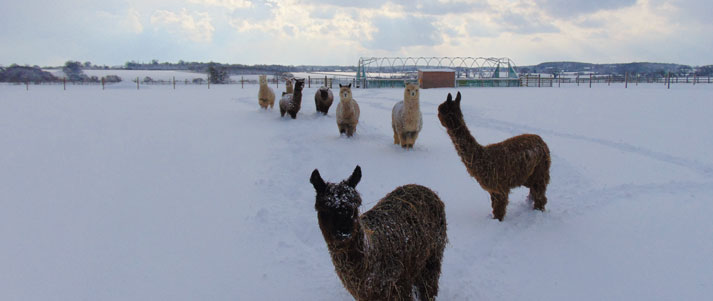
Lucy's story is certainly impressive, and we wouldn't blame you if you were considering following a similar path - but don't go into it under any illusions.
As Lucy is all too keen to stress, owning and running a farm is a huge commitment in itself, let alone as a student. If you're in it for the money, you're probably better off looking at the best paid student jobs.
I wouldn't say it's a goal people should be looking at just to earn money. By all means try to find a job on an alpaca farm - but owning and running one is a huge commitment.
It isn't a job where you can simply book time off - you have responsibilities to these animals and their lives literally depend on you showing up every day, come wind come weather.
Not to mention, you have to face the reality of them becoming ill, or potentially losing one - you become so, so, so attached to these animals and having to say goodbye can be devastating. You've got to understand every single aspect that the job could throw at you - good times, frustrating times and sad times.
I'm not trying to make the job sound worse than it is, but people have to be realistic.
Lucy also warns against anyone - students or otherwise - getting a solitary alpaca as a pet. As she points out, they're herd animals and should never be kept alone.
Nonetheless, that's not to say that you definitely shouldn't get into alpaca farming - or any kind of farming, for that matter. Just be aware that it's not all swings and roundabouts!
There's a great network of alpaca farmers out there that are the most helpful people on the planet - as a group, everyone is in it and learning together.
They stand by the rule of 'there are no stupid questions' and that you should know your limitations - don't have too much pride to say you don't know what to do.
Having said all that, if you have experience of working with alpacas, have the means to own them and properly look after them, go for it. They bring more joy and rewarding moments than you could imagine!
But before you go off and start farming alpacas, remember Lucy's success as the owner and manager of an alpaca farm is thanks in no small part to studying an Agriculture degree. She was also hugely fortunate to have the land and finances available to start the project.
If you don't have much relevant experience (or the necessary funds and land) but want to work with animals, get in touch with your local petting zoo and see if they have any roles with a little less responsibility!
Finally, if you'd like to visit Lucy's farm for yourself, check out the Stubbs Farm website or check out the farm's Instagram account!
Owning and running an alpaca farm isn't for everyone, so here are 50 business ideas to start at uni.
Read More
0 تعليقات